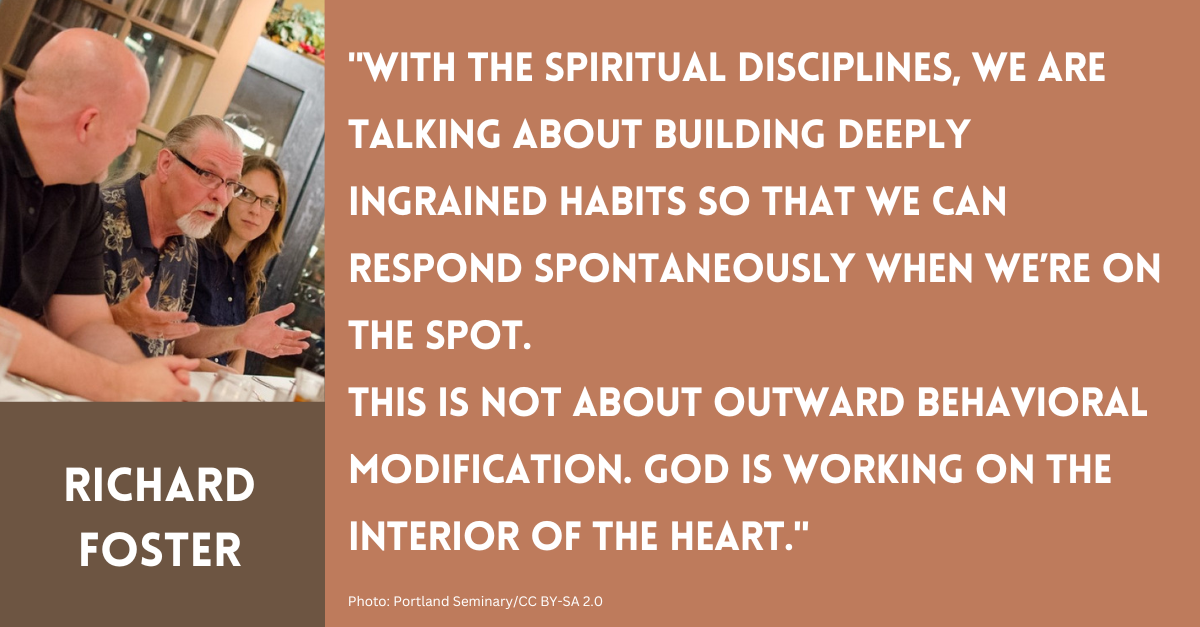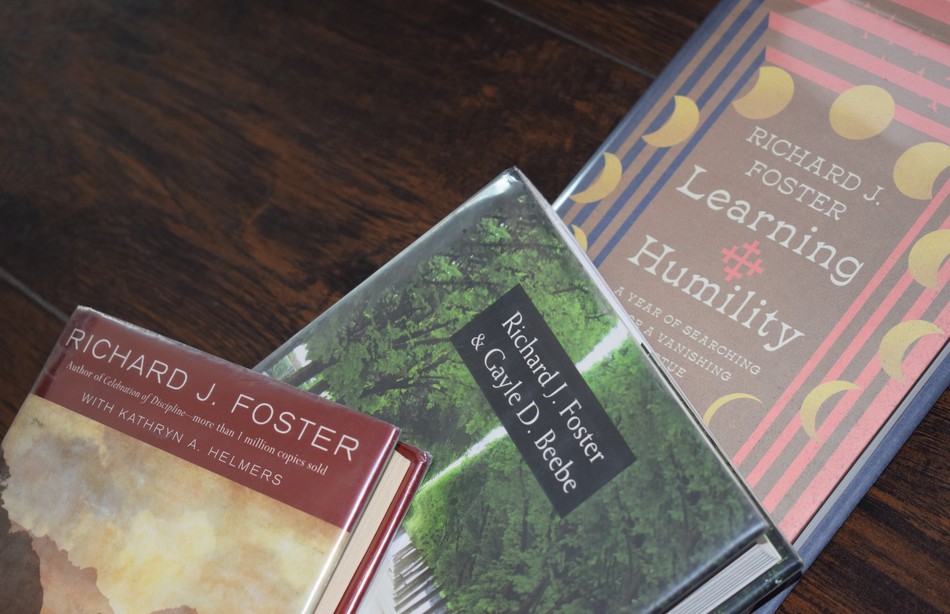In the last 40 years, if anyone has encouraged Christians to seek spiritual disciplines, it’s Richard Foster. He has committed his life to examining, practicing, and teaching disciplines like prayer, fasting, meditation, study, simplicity, solitude, and confession. He has written over a dozen books on the heart of spiritual formation.
What Is Richard Foster Known For?
Richard J. Foster is a pastor and one of the foremost writers and teachers of the spiritual life. His best seller, Celebration of Discipline, has sold over 2 million copies and has been translated into over 25 languages. He has traveled the world speaking on the spiritual disciplines as a path to heart transformation to become more like Christ. Foster has also founded several Christian organizations, most notably Renovaré.
10 Important Events in the Life of Richard Foster
1. Foster was born in New Mexico in 1942.
2. During his childhood in southern California, Foster came to faith in Christ while attending a Quaker church.
3. Foster’s parents passed away while he was a teenager. His church provided money so he could study at George Fox College and Fuller Theological Seminary.
4. Foster became pastor of Woodlake Avenue Friends Church in Canoga Park, California. The challenges of pastoring his congregation led Foster to look for inspiration, and he turned to the devotional classics to learn spiritual disciplines.
5. While pastoring Woodlake Avenue Friends Church, Foster started a lifelong friendship with parishioner Dallas Willard. Willard taught philosophy at the University of Southern California and became a well-known writer on spiritual formation, including The Divine Conspiracy.
6. In 1977, Foster wrote Celebration of Discipline, published by Harper & Row. He later learned that Harper & Row received over 700 unsolicited submissions that year, and his was the only one to be accepted.
7. In 1979, Foster joined the faculty of Friends University. He and his family (his wife Carolynn and their sons Joel and Nathan) moved to Wichita, KS. His position at Friends gave him time to teach but mobility to travel and speak about the spiritual life.
8. In 1986, Richard sensed a call to silence—to step back and listen to God for new instruction. He stepped away from public ministry to consider his next steps. During this time, he met with Luci Shaw, Calvin Miller, and Karen Burton Mains with an idea for starting a Christian writers’ community. The Chrysostom Society held its first meeting in 1987. Its members have included fantasy author Madeleine L’Engle, poet Robert Siegel, and Christian nonfiction author Philip Yancey.
9. During his listening period, Foster felt called to start a new kind of ministry, focusing on church renewal. He founded Renovaré in 1988 and served as its president until 2008.
10. In 2018, Foster retired from public speaking and ministry work. His final book, Learning Humility, appeared in 2022.
What Are Richard Foster’s Main Themes?
Richard Foster’s ministry desires to connect people with the tender heart of God. Even though spiritual disciplines are important to Christian growth, Foster emphasizes they are a means and not the end: The goal is a life with Jesus, a relationship with our Creator, and a transformation of the heart into Christlikeness. As Foster says, it is a training to become Christlike, not a trying.

10 Quotes by Richard Foster
1. “Superficiality is the curse of our age.”
2. “If the idea of the Christian life is to become a friend of Jesus, to learn to walk with God, and to hear God’s voice and obey his Word, then distraction—constant stimuli that takes us away from that kind of life, ability, focus—is a great danger to the person who wants to follow Jesus.”
3. “With the spiritual disciplines, we are talking about building deeply ingrained habits so that we can respond spontaneously when we’re on the spot. This is not about outward behavioral modification. God is working on the interior of the heart.
4. “In meditation, we are learning to hear God’s voice, to obey his Word.”
5. “Through simplicity we live with others in integrity. Solitude allows us to be genuinely present to people when we are with them. Through submission we live with others without manipulation, and through service we are a blessing to them.”
6. “Confession frees us from ourselves and releases us to worship. Worship opens the door to guidance. All the Disciplines freely exercised bring forth the doxology of celebration.”
7. “The desperate need for today is not for a greater number of spiritual people, or gifted people, but for deep people.”
8. “God intends the Disciplines of the Spiritual Life to be for ordinary beings: for people who have jobs, who care for children, who wash dishes and mow lawns.”
9. “Neither should we think of the Spiritual Disciplines as some dull drudgery aimed at exterminating laughter from the face of the earth. Joy is the keynote of all the Disciplines. The purpose of the Disciplines is liberation from the stifling slavery to self-interest and fear.”
10. “The life that is pleasing to God is not a series of religious duties. We only have one thing to do, namely, to experience a life of relationship and intimacy with God.”
(These quotes are taken from Celebration of Discipline and a Christianity Today profile by Kelli Trujillo.
10 Great Books by Richard Foster
1. Celebration of Discipline: The Path to Spiritual Growth. A classic guide helping millions explore a deeper spiritual life rooted in joy, peace, and a fuller understanding of God.
2. Freedom of Simplicity: Finding Harmony in a Complex World. Foster shows that while everyone craves a simpler life, the key is not removing stress or creating more free time. The solution is to see simplicity as a soul-growing spiritual discipline that brings maturity and a deeper connection to God.
3. The Challenge of the Disciplined Life: Christian Reflections on Money, Sex & Power. Foster addresses three themes that not only define huge sections of people’s lives but which Christians must decide how to approach in God-honoring ways. Foster guides readers through their daily decisions, showing them how to put these themes in the right place to avoid misuse.
4. Prayer: Finding the Heart’s True Home. Foster helps the reader understand, experience, and practice prayer in its many forms—from praying without ceasing to prayers of contemplation, healing, blessing, and forgiveness.
5. Prayers from the Heart. Foster provides a collection of prayers who want to experience God as they go about their day. As they juggle work, family commitments, and household chores, Foster encourages the reader to look inward to the heart, upward toward God, and outward to the care of others.
6. Streams of Living Water: Celebrating the Great Traditions of Christian Faith). Foster explores the great traditions of Christian spirituality—study, retreat, service, community—and highlights their role in spiritual renewal, growth, and maturity. He also provides inspiring stories of faithful people living out these “streams,” showing readers what is possible when they follow these practices.
7. Sanctuary or the Soul: Journey Into Meditative Prayer. Foster uses his experiences and those of historic Christians to show readers how meditative prayer can transform their lives. Using obey God more closely. Using biblical teaching, he provides a step-by-step process for readers to quiet their minds and open their souls to communing with God.
8. Celebrating the Disciplines: A Journal Workbook to Accompany A Celebration of Discipline ( with Kathryn Helmers). A combination of journal and workbook to go alongside Foster’s Celebration of the Disciplines, this book shows readers how to go through 52 weeks of using the spiritual disciplines, reflecting on the changes that happen.
9. Longing for God: Seven Paths of Christian Devotion (with Gayle D. Beebe). Drawing on the experiences and stories of faithful Christians, Foster and Beebe—both experienced leaders in spiritual formation—point the reader to the seven key, time-tested, paths to intimacy with God.
10. Seeking the Kingdom: Devotions for the Daily Journey of Faith. Foster offers this collection of devotions for readers seeking to use spiritual disciplines daily. He combines key passages from his previous books with new thoughtful reflections and wisdom.
Photo Credit: Gabriel Salter/Unsplash
Nate Van Noord is from Detroit, MI, a graduate of Calvin University, and has taught high school history for many years. He loves to bike, run, and play pickleball, has been to about 30 countries, and is a three time winner of NPR's Moth Detroit StorySlam competitions.
This article is part of our People of Christianity catalog that features the stories, meaning, and significance of well-known people from the Bible and history. Here are some of the most popular articles for knowing important figures in Christianity:
How Did the Apostle Paul Die?
Who are the Nicolaitans in Revelation?
Who Was Deborah in the Bible?
Who Was Moses in the Bible?
King Solomon's Story in the Bible
Who Was Lot's Wife in the Bible?
Who Was Jezebel in the Bible?
Who Was the Prodigal Son?



.jpg)